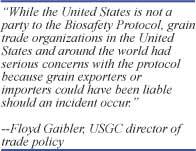After six years of talks, countries who signed on to the Cartagena Protocol on Biosafety reached an agreement last week in Nagoya, Japan, on supplementary text that will establish rules and procedures for liability and redress in case of damage to biological diversity resulting from living modified organisms (LMOs).
LMOs are products derived from modern biotechnology. An example would be biotech corn and soybeans.
“While the United States is not a party to the Biosafety Protocol, grain trade organizations in the United States and around the world had serious concerns with the protocol because grain exporters or importers could have been liable should an incident occur,” said Floyd Gaibler, director of trade policy for the U.S. Grains Council.
The supplemental text shifts any issues from just those moving the grain to the LMO itself, Gaibler explained. “In other words, liability would include all links in the supply chain, and while that doesn’t remove the grain industry from all liability, it does take it off the potential of being the primary focus,� he said. “In general, the grain sector feels that is a positive, key outcome from the meeting that should help avoid trade disputes.�
The new agreement – referred to as a treaty – is now open for signature at the United Nations Headquarters and will enter into force 90 days after being ratified by at least 40 parties to the protocol. More than 150 countries have signed on to the Biosafety Protocol.
While the Council did not officially attend the meeting, it and 21 other associations from around the world are a part of the International Grain Trade Coalition (IGTC), which was formed to provide parties of the Biosafety Protocol a global perspective on the commercial requirements and economics of the global grain trade.
In essence, IGTC works to ensure that the objective of the BSP to protect global bio-diversity could be achieved while meeting the needs of the world’s food, feed and processing industries.
The Biosafety Protocol requires certain types of labeling and testing – in some cases sampling and testing requirements could be extensive. However, a pilot project – a trilateral agreement between the United States, Canada and Mexico – that addresses this has proved to be successful and serves as an example for other countries. Mexico is a party to the Biosafety Protocol while Canada, like the United States, is not.
The trilateral agreement allows the purchase invoice associated with the imported corn to Mexico include the phrase: “This shipment may contain genetically modify living organisms intended for direct use as food, feed, or for processing, that are not intended for intentional introduction into the environment.�
“By making the declaration, Mexico would be in compliance with the Biosafety Protocol,” Gaibler said.
“The trilateral agreement helps minimize unnecessary testing and instead focuses on ensuring LMOs are used the way they are intended and minimize potential issues,� he said. “This is one example of how parties to the protocol can work toward solutions that will not impact trade.�
The language developed as part of the trilateral agreement is the result of efforts between the Council and Mexican feed and food industries, who partnered to form what is known as the Informal Biotech Working Group.
“While the liability issue and trilateral agreement are positive, other concerns remain about how the Biosafety Protocol could impact the future use and movement of products derived from modern biotechnology,� Gaibler said.

